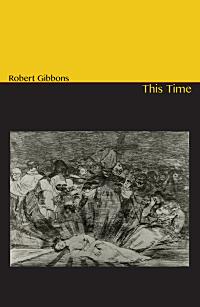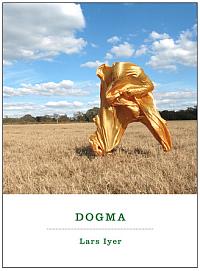|

photo - mw
_______________________
New Scottish poets
edited by Sandra Alland
jacket2
Poems by Lila Matsumoto
The Day
Not
the sinking-stone worry
But the free memory of the day!
The pedal I push
is my foothold on morning,
beating the cannon, the creep
of a benign and faceless blank.
The words I mean to say
are running beside me rushing into the gutter. Others
have taken holiday to make villages
in the sand.
Come
Back. Words come back.
I want to intend,
to cleave the air with sure-foot.
Surely, wherever there is light,
people are growing their meanings.
...(more)
_______________________
The Equator of Alienation [pdf]
Alberto Toscano
What modern capitalism—concentrated and fully established capitalism—inscribes within life’s setting, is the fusion of what had been opposed as the positive and negative poles of alienation into a sort of equator of alienation.
—“Urbanism as Will and Representation” in Internationale situationniste, 1964
The world only appears before my eyes as a solid “landscape,” lustrous like plastic.
—Takuma Nakahira
That landscapes are manufactured or altered by human interests is not a discovery of late capitalism. Whether seen as pictorial genre or as ideology, the representation of landscape has allowed the modern subject to frame his mastery over nature—crucially by clearing the land of indigenous, insurgent, and independent inhabitants—in terms of a propertied metaphysics. But the representation of landscape also functions to depict human artifacts, imprints of social intercourse.
When the landscape is not scoured for traces—aftermaths of trauma, indices of futures past—its indeterminacy is most often coded as indifference: the indifference of modularity and iteration across social spaces, the indifference of concrete abstraction (pun intended). It is an indifference remarkable for its ubiquity and magnitude, as well as for the sheer scale of its continued reproduction—tract homes all the way into a vanished horizon, container terminals that never sleep, banks of screens in a stock exchange.
...(more)
Taipei Biennial 2012
_______________________

photo - mw
_______________________
Our Nature is to Change Our Nature: Bertrand Ogilvie and Political Anthropology
a review of La Second Nature du Politique: essai d'anthropologie négative
unemployed negativity
"Nature and education are somewhat similar. The latter transforms man, and in so doing creates a second nature." Democritus
(....)
... Our transformed nature can just as easily lead to genocide and mass destruction as it can to the liberation of the multitude. Here Ogilvie's writing on second nature intersects with his writing on "l'homme jetable" the disposable man of mass death that for him defines modern existence. As Ogilvie argues it is necessary to avoid both catastrophism and providentialism in any analysis of the present. It is necessary to think the current moment without any telos, any finality, negative or positive, in order to grasp its constitutive conditions. One could say, taking Italian figures as orienting points, that Ogilvie distances himself both from Negri and Agamben. (His earlier book, L'homme jetable includes an interesting reading of Spinoza's nightmare of the "scabby brasilian" one that connects it not to the consitutive power of the imagination but the unthematized horror of colonialism. Colonialism too is a conatus, a striving).
Ogilvie's thought takes place in what could be considered a general revival of philosophical anthropology. A revival that includes Virno, Balibar, and Stiegler, to name a few. What Ogilvie adds to this theoretical conjuncture is the insistence of the negative, not the negative as an apocalyptic vision of what is to come but the indetermination internal to every determination....(more)
_______________________
What does spirituality mean in America today?
Courtney Bender and Omar M. McRoberts
(....)
Rather than take sides in the debate over the political possibilities of spirituality, we have decided to take a closer look at the way in which it has been framed and mobilized. We observe, for example, that social scientific definitions of religion have been and remain tightly interwoven with ideals of civic participation, putative and legally enforced distinctions between private and public life, the historical development of voluntarism, and discourses of individual and collective rights. “Spirituality,” in this respect, is often used to mark religious forms that do not ostensibly align with these norms. In other words, it is used to designate what are perceived to be extra-social or anti-social modes of religion, which in turn reinforces norms of both sociality and political mobilization. It is fair to note that this use of “spirituality” also carries some positive associations, however: some of those who take on a spiritual identity, it is said, are actively choosing to opt-out of political and institutional-religious interactions, in favor of something that they imagine to be more real, more personal, or more authentic than what they understand by religion—or, for that matter, by politics.
By focusing our attention on the emergence of various uses of “spirituality” and the intersections between its scholarly and public acceptations, we are orienting our investigation toward the relational work that religion and spirituality do in shaping our perception of individual, religious, and political possibilities. We might then ask, for example, how the continued preponderance of an academic discourse on American religion that enshrines voluntarism, religious freedom, and civic participation as essential (and essentially American) virtues determines our view of the spectrum of possibilities for political action. If as a result of closer attention to the phenomenon of spirituality scholars are able to view “religion” and its intersections with American politics in more complex ways than those sustained by the conventional lore centered on congregational life and voluntarism, the payoff would be significant....(more)
Mapping A Field: Why And How To Study Spirituality [pdf]
Courtney Bender & Omar Mcroberts
_______________________
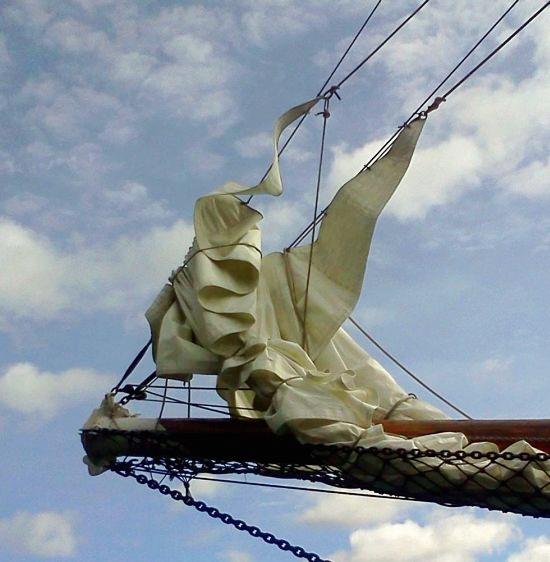
photo - mw
_______________________
On the Leakiness of Surveillance Culture, the Corporate Gaze, and What That Has To Do With the New Aesthetic
Quiet Babylon
_______________________
The Coming Civil War over General Purpose Computing
Cory Doctorow
_______________________
Gertrude Stein: Poetry & Grammar
posted by Sina Queyras
lemon hound
What is poetry and if you know what poetry is what is prose.
There is no use in telling more than you know, no not even if you do not know it.
But do you do you know what prose is and do you know what poetry is.
I have said that the words in plays written in poetry are more lively than the same words written by the same poet in other kinds of poetry. It undoubtedly was true of Shakespeare, is it inevitably true of everybody. That is one thing to think about. I said that the words in a play written in prose are not as lively words as the words written in other prose by the same writer. This is true of Goldsmith and I imagine it is true of almost any writer.
There again there is something to know.
One of the things that is a very interesting thing to know is how you are feeling inside you to the words that are coming out to be outside of you.
...(more)
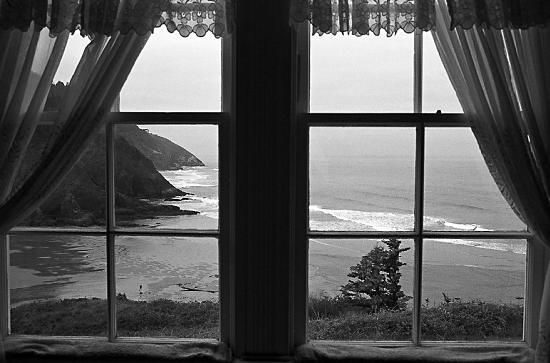
North Coast
George LeChat
Hiding in Plain Sight
_______________________
Paean to Place
Lorine Niedecker
(....)
I grew in green
slide and slant
of shore and shade
Child-time—wade
thru weeds
Maples to swing from
Pewee-glissando
sublime
slime-
song
Grew riding the river
Books
at home-pier
Shelley could steer
as he read
I was the solitary plover
a pencil
for a wing-bone
From the secret notes
I must tilt
upon the pressure
execute and adjust
In us sea-air rhythm
“We live by the urgent wave
of the verse”
...(more)
_______________________

photo - mw
_______________________
As Flowers Turn towards the Sun [pdf]
Walter Benjamin’s Bergsonian Image of the Past
Andrew McGettigan
The generation of a concept of history that resists the realized unreason of contingency and counterfactual historiography will require a metaphysical armature in order to put the crucial question to the eternalized present of governmental administration. Adorno, in his most Benjaminian moment, wrote: 'beside the demand thus placed on thought, the question of the reality or unreality of redemption itself hardly matters.'63 If we wager that thought, beyond its ability to record, can contribute to stripping the future of its cruel wonders, its barbaric magic, then Benjamin lies ahead of us as more than an attenuated emblem of melancholy.
_______________________

Icy Prospects /#3
Where Compasses All Go Mad
Jorma Puranen
Galerie Anhava
Review: Icy Prospects by Jorma Puranen
Joerg Colberg
_______________________
Half of the Facts You Know Are Probably Wrong
A review of The Half-Life of Facts: Why Everything We Know Has an Expiration Date by Samuel Arbesman.
Ronald Bailey
(....)
People also cling to selected “facts” as a way to justify their beliefs about how the world works. Arbesman notes, “We persist in only adding facts to our personal store of knowledge that jibe with what we already know, rather than assimilate new facts irrespective of how they fit into our worldview.” All too true; confirmation bias is everywhere.
(....)
So is there anything we can do to keep up to date with changing facts (other than constantly reading Reason)? Arbesman suggests that simply knowing that our factual knowledge bases have a half-life should keep us humble and always seeking new information. Well, hope springs eternal. More daringly, Arbesman suggests, “Stop memorizing things and just give up. Our individual memories can be outsourced to the cloud.” Through the Internet, we can “search for any fact we need any time.” Really? The Web is great for finding a list of the ten biggest cities in the United States, but if the scientific literature is merely littered with wrong facts, then cyberspace is an enticing quagmire of falsehoods, propaganda, and just plain bunkum. There simply is no substitute for skepticism....(more)
_______________________
Ghost Flower & Wind – A Tale of Deep Brain Stimulation
Barbara Ellen Sorensen
I am memory alive
not just a name
But an intricate part
of this web of motion,
meaning: earth, sky, stars circling
my heart
centrifugal.
—Joy Harjo
A kind radiologist from outside the C-spine MRI tube pats my head and murmurs, “See, you’re not really entirely enclosed.”
But I am. ...(more)
Non-Fiction Introduction: The Body Silentedited by Heather Bryant / Suzanne Paola drunken boat 15
_______________________

Sixteen Steps to Paradise 3
Jorma Puranen
1 2 3
_______________________
“Translation: the philosopher’s task”, interview with Gabriel Catren
Interview by Jeremy Lecomte, translated into English by Sara Heft
Given my double passion for science and philosophy, the problem of clarifying the links between the two and between what I refer to as local orabstract modes of thought (such as the sciences, the arts and politics) has always been of utmost importance to me. To treat this problem, I wished to challenge both the solutions that subject these different modes to philosophical authority (be it ontological, transcendental, epistemological, encyclopedic or other), and the solutions which – inversely – subject philosophy to the model furnished by one of these modes, to the detriment of the others (as, for example, Husserl’s conception of philosophy as archi-science, Heidegger’s conception of philosophy as archi-poetry, or Levinas’s conception of philosophy as archi-ethics). In Benjamin’s theory of translation, I found a solution capable of satisfying two presumably irreconcilable constraints: 1) that of not yielding on the delocalized or transversal nature of philosophical work compared to different local modes of thought – and thus avoiding any potential identification with one of these modes; and 2) that of refusing any dominant position of philosophy toward said modes of thought. In short, Benjamin’s text allowed me to construe the connections between local modes of thought and philosophy by following the model offered by the connection between national languages and the regulatory idea of a delocalized and voluntarily impure language produced by the work of transposition and transfer undertaken by “translation”. ... Philosophy alone is able to construct mediators – herein lies its truly angelic dimension – capable of probing the interzones that separate and connect the various modes of thought, in order to incessantly build what I refer to as a musaic language, following on from Benjamin....(more)
If Verso
Database and Social Network for Books in Translation
via ReadySteadyBook

photo - mw
_______________________
In Which Things That Hurt Us Are Stored for Winter
Amaranth Borsuk
Take your picture? Here’s your little injury
bread box, decorative
prison of appropriated lowerings
where heart swallows acorn
after acorn, each one going down
like an open vowel.
What’s kept’s ycleped cuttage:
panem et circenses
for us the held-to helps yell out.
...(more)
Amaranth Borsuk
Harp & Alter_______________________

Okawa, 2009
Toshio Shibata
Preview: Paris Photo 2012
Lens Culture
_______________________
Autumn Comes
Li Ho (790-816)
Translated by Arthur Sze
Wind in the plane tree startles the heart: a grown man's grief.
By dying lamplight, crickets are weeping cold threads.
Who will ever read the green bamboo slips of this book?
Or stop the ornate worms from gnawing powdery holes?
Such thoughts tonight must disentangle in my gut.
In the humming rain, a fragrant spirit consoles this poet.
On an autumn grave, a ghost chants Pao Chao's poem,
and his spiteful blood, buried a thousand years, is now green jade.
Poems from Arthur Sze's The Silk Dragon:Translations from the Chinese
drunken boat courtesy of Copper Canyon Press
_______________________
More on Joan Didion
Justin E. H. Smith
... here she is on fundamentalist Christians in the American West: "He seemed to be one of those people, so many of whom gravitate to Pentecostal sects, who move around the West and the South and the Border States forever felling trees in some interior wilderness, secret frontiersmen who walk around right in the ganglia of the fantastic electronic pulsing that is life in the United States and continue to receive information only through the most tenuous chains of rumor, hearsay, haphazard trickledown. In the social conventions by which we now live there is no category for people like Brother Theobold and his congregation, most of whom are young and white and nominally literate; they are neither the possessors nor the dispossessed... In the interior wilderness no one is bloodied by history, and it is no coincidence that the Pentecostal churches have their strongest hold in places where Western civilization has its most superficial hold. There are more than twice as many Pentecostal as Episcopal churches in Los Angeles." (I note that since the rise of the Internet the number of such people, who, online, are by definition tapped into the nerve ganglia of the modern information society but nonetheless are as ignorant as medieval peasants, appears to have expanded a hundredfold.)...(more)
_______________________

Gueorgui Pinkhassov
Dappled Things: Pinkhassov on Instagram
Teju Cole
The New Inquiry
(....)
There are good reasons to be suspicious of this flood of images. What is the fate of art in the age of metastasized mechanical reproduction? These are cheap images; they are in fact less than cheap, for each image costs nothing. Post-processing is easy and rampant: beautiful light is added after the fact, depth of field is manipulated, nostalgia is drizzled on in unctuous tints of orange and green. The result is briefly beguiling to the senses but ultimately annoying to the soul, like fake breasts or MSG-rich food. I like Matt Pearce’s thoughtful polemic on this subject, published on these pages: “Never before have we so rampantly exercised the ability to capture the way the world really looks and then so gorgeously disfigured it.”
(....)
All bad photos are alike, but each good photograph is good in its own way. The bad photos have found their apotheosis on social media, where everybody is a photographer and where we have to suffer through each other’s “photography” the way our forebears endured terrible recitations of poetry after dinner. Behind this dispiriting stream of empty images is what Russians call poshlost: fake emotion, unearned nostalgia. According to Nabokov, poshlost “is not only the obviously trashy but mainly the falsely important, the falsely beautiful, the falsely clever, the falsely attractive.” He knows us too well.
...(more)
_______________________
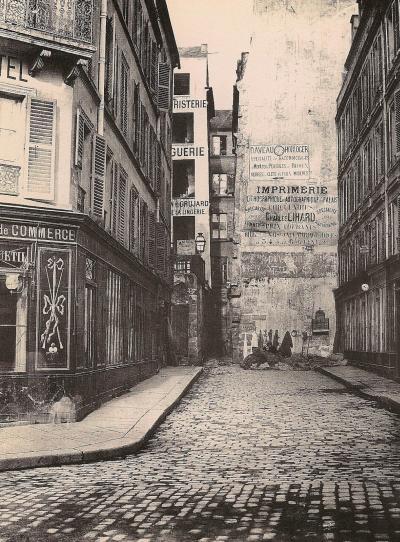
Rue Mondétour, Paris
c. 1865
Charles Marville
Ghosts, shadows
Poemas del rķo Wang
_______________________
The Other Face of God [pdf]
Lacan, Theological Structure, and the
Accursed Remainder
Levi R. Bryant
... While not wishing to follow Levi-Strauss all the way in arguing that structures are ahistorical invariants of the human mind, in this paper I do wish to argue—drawing heavily on Lacanian psychoanalytic theory—that religion is a particular structure of thought and human social formations. From this I will draw some structural or systemic consequences that follow from this structural organization. In particular, I wish to identify some structural features characteristic of a particular type of religious thought and social organization pertaining to monotheism in terms of the subject’s precarious relationship to language, masculine sexuation, and the role that objet a plays in our economy of desire.
Speculations III [pdf]
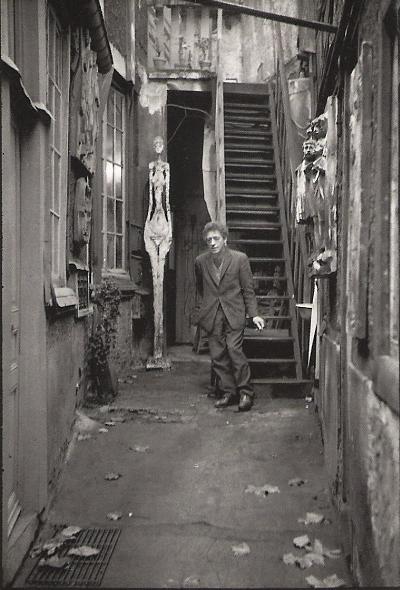
Alberto Giacometti
b. October 10, 1901
_______________________
from The Crystal Text
Clark Coolidge
(....)
But I will not have the opportunity to do that.
I will not see myself later. On the average
no razor blades, no fans, no opportunities for
lifting the manhole and peering down within. But
everything, on the order of chaos, is possible. For
one, and the same me. The one out of order,
by the back door, the other. He needs no opportunities
for all is permitted, on the reverse side, the never
to be revealed to me. What I don't know
is the absolutely not to be known. I have no
sister. No brother either. There is now only me
and the same, the reverse, the intransigent
order. Out there loose in the all. And
no sense, I realize, in copying this out.
Under the city lies no space for me.
I keep spinning the crystal to see all sides
but I can never exactly see the side that is
turned away. In Japanese the haiku requires
17 syllables. In my language as many more as may prove
necessary. And it's a long enough might but never
that long. We pass from bit to bit, and even
exchange some of the bits between is. He lives
three avenues down, near the blue skylight above the
dirt factory. I pick up the copy of the book of
Thomas Mann I will never read. I admit same
to a certain one by letter. A volume of small
plays of a mechanical scent. Sea mice, gills
developed, under study at present. All the possibilities
in a grave and at once. Certifiable commencement.
Glands that produce laughter. Snails with seals.
Globes of clear dust attached to the palms.
Poems in a posthumous form. Follow the wake
before the vessel has left the dock. Trail
your hands before speech.
...(more)
Crystal gazing
Clark Coolidge’s ‘Crystal Text’
Jason Morris jacket2
(....)
In The Crystal Text, Clark Coolidge writes, “Transparency a matter of slowly mattering," torquing noun into verb and revealing in a flash both the semantic and scientific senses of ‘matter.’ The transparent matter of crystal accrues, slowly mattering itself into being. In the same way, the potential (however slight) for “transparency” in writing is “a matter of slowly mattering.” By turns transparent and opaque, The Crystal Text returns to the object of its contemplation — the crystal — and also to the grounds of its own composition. Matter amalgamates in gradual improvisation of poetic language and thinking, as Coolidge’s long poem accumulates its matter, layer by layer, letter by letter. It contains itself in much the same way a crystal does, and is a crystalline record of its growth.
(....)
If poems contemplating mute vessels (urns, jars) could be considered “standards” (in the sense of “All the Things You Are,” or “How High the Moon”), The Crystal Text returns to its head, or main theme, with a deliriously clear love of the form. Just as a crystal improvises its form (albeit — crucially — according to certain unseen constraints and systems), the poem stands as a record of its own improvised composition. Its form is a record of its relationship over time to the mute object of its inquiry, the crystal, in chunks of lived days, the sometimes clipped, sometimes sprawling sections of poetry which make up the long poem The Crystal Text. In Now It’s Jazz, Coolidge quotes Kerouac writing (in Visions of Cody) about jazz saxophonist Lee Konitz: “He can take care of himself even though he goofs and does April in Paris from inside out as if the tune was the room he lived in and was going out at midnight with his coat on.” Coolidge continues, “Yeah. That has the feeling of improvisation starting at a base and going out and you can get back if you want since you know where that is but you can also go anywhere and take whatever form in the going you want”. The tune, like the poem, records this form of departure from and return to theme. As obscure, dissociative lines snap in and out of focus, the crystal remains The Crystal Text’s base, a refrain strangely familiar in all its variations. The image of the clear piece of rock is suddenly and clearly summoned to the reader’s mind out of some piece of otherwise alien phrasing: as “Sky flake in a water pocket”, or “Stable portion, sense lesson, icicle twilight”, or “unlit candle”; as “a jet stripe of firm”, or “A scarf that is the weather’s edge / a rig of partial light” . These variations on the theme of the crystal are the matter of the poem; the poem’s transparency (or, turned to view from a different facet, its opacity) a matter of their mattering. As in good jazz, it’s all in the phrasing — fidelity to the theme and headlong, syncopated departure from it....(more)
_______________________
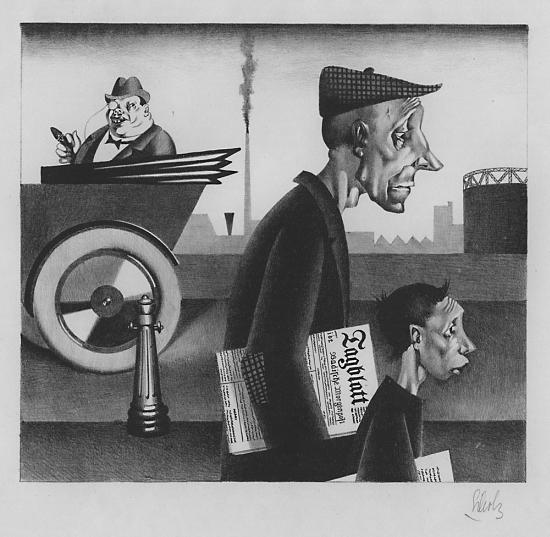
Georg Scholz
_______________________
Common Voices 8 [pdf]
Some debates never give up their ghost. Ideas related to ‘knowledge’ for instance command a high premium in rhetorical, philosophical and political realms and are deliciously evergreen in their appeal, both to the lay and the expert intellectual. We too happily succumbed to the temptation to revisit, discover, represent and share with our readers ideas of knowledge through a fascinating collection of articles.
The most exhilarating aspect of producing this issue has been the difficulty in setting limits to what exactly we could cover. Discarding the earlier approach was the only way to do it. Rather than describing this issue of Common Voices as one that focused on ‘knowledge commons’ or on ‘new commons’, we invited articles on a diverse range of subjects linked to knowledge, technology and governance to see what bearing their views held for an audience interested in the commons. What would be the relevance of highlighting these views and debates? One needs only to contrast these articles with the official view on knowledge. India’s Knowledge Commission and its reports are attempts to live up to our putative obsession with knowledge as a nation. These official policy documents spring forth from a rigid foundation of ideas that assesse the knowledge stock of the nation with progress in the field of high science—which deifies the educational edifice, and more importantly the privileges, of the physical sciences over other disciplines of knowledge.
Setting aside the quest for a universal truth within the debates on knowledge, the articles in this issue challenge the notion that one form of knowledge alone will enable progress in that quest. Social scientist, columnist and science critic, Shiv Visvanathan, whose article on the logic of knowledge commons inaugurates this issue of Common Voices, likens the official reports of the Knowledge Commission as proof of this nation’s burden—its responsibility to inject (‘as in a vaccine’) a move towards a knowledge economy rather than a knowledge society. He draws us towards a ‘self-reflexive epistemology of knowledge’ and emphasises the appreciation of cognitive justice as a guiding principle—a concept which helps enliven pallid ideas of development and poses a challenge to obsolescence of various knowledge systems. He stresses the need for a new imagination of democracy through embracing a political epistemology of knowledge.
_______________________
Eric Hobsbawm's Introduction to the 2012 Edition of Marx & Engels 'The Communist Manifesto'
_______________________
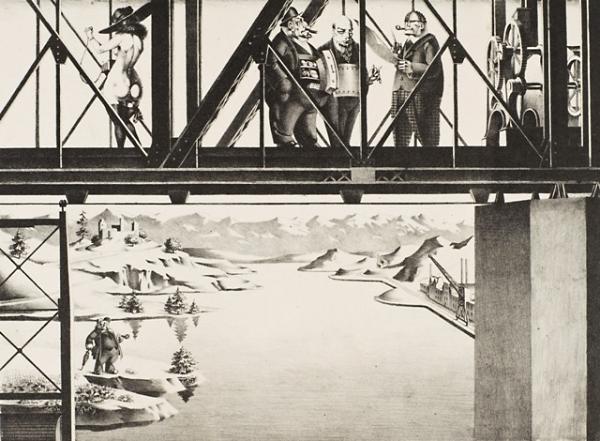
Lords of the World
(1922)
Georg Scholz
b. October 10, 1890
_______________________
Politicopsychopathology
Neurotocrats vs. the Grand Old Psychosis
Benjamin Kunkel
“As mankind improve, the number of doctrines which are no longer disputed or doubted will be constantly on the increase: and the well-being of mankind may almost be measured by the number and gravity of the truths which have reached the point of being uncontested.”
Mill’s essay today sounds both antique and contemporary. Pre-Freudian and pre-Edisonian, it doesn’t consider the possibility of deep psychic attachments to error or, naturally, the manipulations of opinion enabled by photography, radio, film, TV, and, these days, electronic audiovisuals of all kinds. (An account of the special power of these media would begin with two observations: their production and distribution is more easily concentrated in a few hands than that of written language, and, being partly non-verbal, these media more easily circumvent rational consideration.) And yet Mill is also contemporary, or at least current: debates around the First Amendment continue to take place with allusions to his arguments and even invocations of his name.
(....)
The point is only that if we listen to his words—or to almost any contemporary political speech—we find ourselves not in the position of a rational interlocutor, but in that of a shrink faced with a patient: here is a someone who either doesn’t believe what he says or says it for other reasons than he gives, and yet whose real reasons and motives are inaccessible to us, and may be to him, too.
In math class they ask you to show your work, so that if you get the wrong answer you can later see where you went astray. In American political life today, you never show your work. So the answer to any question we take to be code for a hidden dream-work, to use Freud’s term for the impacted logic of dreams. In this way, for instance, even Mitt Romney’s pledge to relieve mass unemployment by cutting taxes for “job-creators,” in the question-begging term, seems to refer not to any underlying economic theory, which he would never in any case elaborate, but to a concealed preference for the rich to get richer. Such a motive is not even, however, comprehensibly economic, since Romney himself is so rich already; it could only emerge out of some obscure compound of class-loyalty, self-admiration, cultural nostalgia, power hunger, or other elements altogether. Romney would anyway deny the motive we impute to him, and his denial might be sincere. The point is only that if we listen to his words—or to almost any contemporary political speech—we find ourselves not in the position of a rational interlocutor, but in that of a shrink faced with a patient: here is a someone who either doesn’t believe what he says or says it for other reasons than he gives, and yet whose real reasons and motives are inaccessible to us, and may be to him, too. ...(more)
_______________________
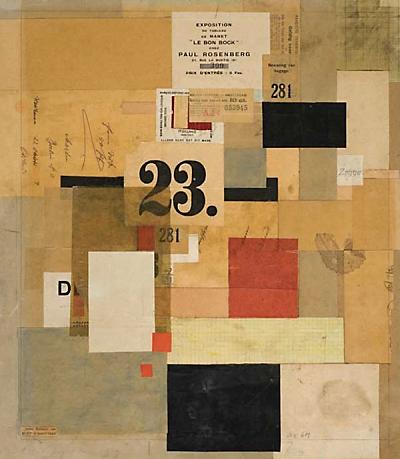
Robert Gibbons: Says Schwitters, Hanover
Ordinary finds
(....) Love how when you see something by Kurt Schwitters you know the form & build-up says Schwitters, Hanover. That’s what I’m after in paragraphs. An instantly recognizable form. (He knew what I mean, …machines are abstractions of the human spirit.) Look at that black square in the collage of paint & paper next to title MZ 601, 1923. It sends me like a condensed paragraph or typed postcard, the blackness carrying a subtle, untranslatable meaning. It moves me! Big number 23! Both 281s!! Let the artist speak, & not speak at the same Time: Exposition au Tableau de MANET “Le Bon Book”. How the red rectangle placed randomly/ strategically above plain grid of graph paper enters the heart like a postcard. Look, again, as I just did to the right, postmark cut in thirds, recognizably from Hanover....(more)

Helsinki, Finland
1992
Pentti Sammallahti Here, now
Pentti Sammallahti
Finn Thrane
books from Finland
1 2 3
_______________________
Conversation strives toward silence, and the listener is really the silent partner. The speaker receives meaning from him; the silent one is the unappropriated source of meaning. The conversation raises words to his lips as do vessels, jugs. The speaker immerses the memory of his strength in words and seeks forms in which the listener can reveal himself. For the speaker speaks in order to let himself be converted. He understands the listener despite the flow of his own speech; he realizes that he is addressing someone whose features are inexhaustibly earnest and good, whereas he, the speaker, blasphemes against language.
But even if he revives an empty past through orgiastic excitement, the listener hears not words but the silence of the present. For despite the flight of spirit and the emptiness of words, the speaker is present; his face is open to the listener, and the efforts made by his lips are visible. The listener holds true language in readiness; the words enter him, and at the same time he sees the speaker.
Whoever speaks enters the listener. Silence, then, is born from the conversation. Every great man has only one conversation, at whose margins a silent greatness waits. In the silence, energy was renewed; the listener led the conversation to the edge of language, and the speaker creates the silence of a new language, he, its first auditor.
Silence is the internal frontier of conversation..............
The Metaphysics of Youth
Walter Benjamin
Selected Writings Vol.1, 1913-1926
Ed. Marcus Bullock, Michael W. Jennings
google books
_______________________
The Content Of History Will Be Poetry
Barbara Henning
eoagh
Olson had no need for the armor of a unitary, diachronic, rational history. We poets are historians. "Then he, if he chooses to speak from these roots, works in that area where nature has given him size, projective size." Whitman size. Maximus mythic Olson. If we begin here, Olson implies, many changes will occur in the poem and in the lived life. Robert Duncan in the introduction of The Special View: "I don't mean he wanted things to happen in his classes. He wanted things to happen in them spiritually.
. . Charles wanted to produce a new and redeemed man. This is actually Charles' alchemy." That's clear when I re-read his essays. Even though Olson didn't wear zen loafers or formally practice yoga, he was a-leaning-into yogi-zen-poet teacher....(more)
_______________________

Nature Morte Au Hibou
Bernard Buffet
d. 4 October 1999
_______________________
Textual Communities: Nancy, Blanchot, Derrida
Kuisma Korhonen
Culture Machine
You find yourself in a dark room with a table, a chair, and a small circle of candlelight. On the table lies an open book. You are facing the text, and nothing but the text. Everything else in the room disappears in the shadows. There is nothing but the text and you, encountering each other in the, so it seems, eternal presence of Midnight.
This is the scene that we find at the beginning of Stephane Mallarmé's Igitur, a scene that we could call the primal scene of pure textual encounter. This is our phantasmatic image of reading: a moment of perfect communication, where we find the textual other waiting for us, lying on the table, always ready and willing to give itself to us; and the textual other finds us alone, in perfect solitude where we are ready to yield ourselves completely to it, with nothing that could disturb the pure ecstasy of encounter, in the presence that is Midnight, the end of time. In this scene, I find myself totally outside myself, in the text, the text being totally outside itself, in me. There is nothing that could put an end to the pure, never-ending circle of reflection between me and the text, this exchange where all thirds are at least temporarily excluded....(more)
_______________________
TWO LINES Online October 2012
Center for the Art of Translatio
_______________________
M@h*(pOet)?ica–Louis Zukofsky’s Integral
Bob Grumman
_______________________
American Imperfectionism: Siobhan Phillips’ Poetics of the Everyday
David Auerbach
waggish
... Phillips spins a philosophical construction around the work of four 20th century American poets–Robert Frost, Wallace Stevens, Elizabeth Bishop, and James Merrill–and draws out some significant unifying threads in their treatment of time. Though her method is one of close reading supplemented by biographical detail, there is a much heavier conceptual infrastructure than one finds in most contemporary poetry criticism, which tends to focus on linguistic assemblage above all else. This is much to the book’s credit. It’s a book I can engage with on the level of life.
The concern here is time, and specifically differing human conceptions of time. As concerns go, it is about as fundamental and structural as one can get: Erich Auerbach, Georges Poulet, and Paul Ricoeur all have written on how conceptions of time can act as generative and differentiating forces in literature and human life, and how they affect time’s subjective twin, memory....(more)
_______________________

photo - mw
Twelve years have passed since I first hopped on the blog wagon.
Thanks to all the steadfast followers for their interest and support.
mw
_______________________
Fairfield Porter’s John Ashbery
John Latta
Claustral and nonce is the day, sense of being shuttered up with my druthers. (Oh, for the simple horse badorties to say something affably jive like—James Schuyler, in a letter to John Ashbery, 14 October 1968—“maybe I’ll rustle up a batch of Chewy Noels, as featured in Fanny Farmer.” Or garrulous and bode—Kenneth Koch, in a collaboratory piece “To James Schuyler” writ c. 1956 with Fairfield Porter—“my inspiration needs a Frank.”) I think of Emerson’s glum tidings (“Experience”):
It is very unhappy, but too late to be helped, the discovery we have made, that we exist. That discovery is called the Fall of Man. Ever afterwards, we suspect our instruments. We have learned that we do not see directly, but mediately, and that we have no means of correcting these colored and distorting lenses which we are, or of computing the amount of their errors. Perhaps these subject-lenses have a creative power; perhaps there are no objects. Once we lived in what we saw; now, the rapaciousness of this new power, which threatens to absorb all things, engages us.
No objects but in books, their collateral means, disseminatory and abrupt. My wordless critique.
...(more)
_______________________
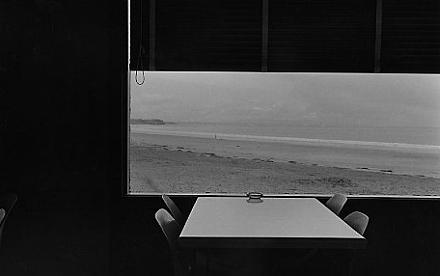
Santa Cruz, California
Richard Gordon
Gitterman Gallery
_______________________
Three Poems
Taha Muhammad Ali
Empty Words
Taha Muhammad Ali
translated by Peter Cole
Ah, little notebook,
yellow as a spike of wheat
and still as a face,
I’ve protected you
from dampness and rodents
and entrusted you with
my sadness and fear,
and my dreams—
though in exchange I’ve gotten from you
only disobedience and betrayal…
For otherwise where are the words
that would have me saying:
If only I were a rock on a hill…
unable to see or hear,
be sad or suffer!
And where is the passage
whose tenor is this:
I wish I could be
a rock on a hill
which the young men
from Hebron explode
and offer as a gift to Jerusalem’s children,
ammunition for their palms and slings!
And where is the passage
in which I wanted
to be a rock on a hill
gazing. out from on high
hundreds of years from now
over hordes ,.
of masked liberators!
...(more)

photo - mw
_______________________
The Lilacs and the Roses (Les lilas et les roses)
Louis Aragon
b.October 3, 1897
Translated by A. S. Kline
O months of flowering months of metamorphosis
May without a cloud and June lacerated
I will never forget the lilacs or the roses
Nor those spring’s folds have consecrated
I will never forget the tragic illusion
The procession cries crowd the sunlit clarity
The tanks laden with love the gifts from Belgium
The air that quivers the road this buzzing of bees
The rashness of victory that primes a quarrel
The red blood that a carmine kiss prefigures
And those about to die at the turrets, mortal,
Covered in lilacs by intoxicated watchers
I will never forget the gardens of France
Seeming the missals of vanished centuries
Nor the uneasy twilights enigma of silence
The roses all along the route of our journeys
The denial by flowers of the winds of panic
Of the soldiers passing by on wings of fear
Of the mad bicycles of the cannon, ironic,
Of the fake campers’ pitiable gear
Yet why does this tempest of images
Return me forever to one point of rest
At Saint Marthe A General Dark branches
A Norman villa the forest’s furthest edge
All’s quiet the enemy at rest in shadows
They say that Paris surrendered tonight
I’ll never forget the lilacs or the roses
Nor the twin loves we have lost outright
The first day’s bouquets lilacs lilacs from Flanders
Shadowy softness whose face death paints anew
And bouquets of the retreat roses tender
The colour of fire far roses of Anjou
Selected French Poems of the 20th Century
Translated by A. S. Kline
_______________________

Llanthony Abbey
1942
John Craxton
_______________________
Enigma of Revolt
Kafka on Occupy
Andy Merrifield
adbusters
Over the past year or so, Occupy has provoked an epistemological break in the ontological morphing of our social, political, and economic life – that subtle, creeping shift of our being in the world.
In 1984, in his famous essay, “Post-modernism, or, the cultural logic of late capitalism,” Fredric Jameson announced, amongst many other things, something significant: “the abolition of critical distance.” Henceforth critical distance finds itself thoroughly outmoded and impotent. There’s no longer any without, only within, no repositioning of ourselves beyond what we culture jammers are critically analyzing, critically struggling against; there is now no way for us to get critical leverage on the beast shaping us.
(....)
Our world is a different place to what it was in 1968. It permits different hopes and dreams, poses different threats and possibilities. Paradoxically, today’s reality is more easily critiqued than ever before using basic Marxist tools. At the level of analysis, it has never been simpler to adopt a classical Marxist stance and be right. And yet, at the level of political practice, that analysis seems far too facile, far too futile to lead us anywhere constructive. There’s little in this analysis and ensuing critique that leaves us with any guides as to political practice, to practical struggle, to how we might act on this knowledge. One of the difficulties is that the world we think about, the world that functions through a particular economic model, is classically Capital-ist in the sense of Marx’s great text; yet the world we have to act in, the world we have to organize in, is tellingly Kafkaesque. Marxists know how to analyze and criticize this reality; indeed, we know all too well, sometimes a little too well for our own good. But we know less about how to act, how to construct a practical politics from the standpoint of this theoretical knowledge. There’s no direct correlation between the two. We have yet to resolve the enigma of revolt.
The present conjuncture is Kafkaesque to the degree that castles and ramparts reign over us everywhere. These castles and ramparts are usually in plain view, frequently palpable to our senses, even inside us, yet at the same time they’re distant and somehow cut off, somehow out of reach and inaccessible; their occupants are evermore difficult to pin down when we come knocking at their doors, providing we can find the right door to knock on. Kafka was better than Marx at recognizing the thoroughly modern conflict now besieging us under capitalism. Marx understood the general dynamics of the production of castles and the trials this system subjects us to. But he understood less about its corridors of power and how its organizational bureaucracies functioned. Marx understood the difficulty of waging war against a process; however, he was never around long enough to imagine how this process would one day undergo administrative (mis)management, how it would not only get chopped up by massively complex divisions of labor: it would also beget even more massive bureaucratic compartmentalizations, done by unaccountable and anonymous middle-managers.
Kafka knew how modern conflict wasn’t just an us against other people class affair, but an us against a world transformed into an immense and invariably abstract total administration. The shift Kafka makes between his two great novels, The Trial (1925) and the unfinished The Castle (1926), makes for a suggestive shift in our own supranational administered world. ...(more)
_______________________
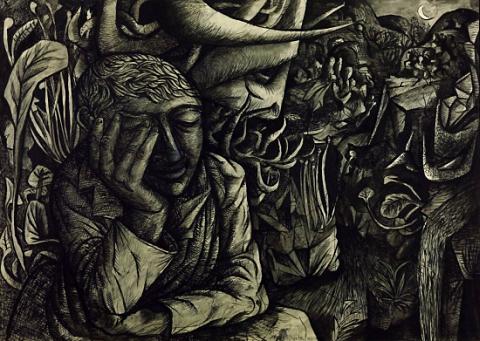
Dreamer in Landscape
1942
John Craxton
b. October 3, 1922
_______________________
Five Poems from “Mouth of Hell”
Marķa Negroni
Translated from Spanish by Michelle Gil-Montero
words without borders
Stunning idiocy of some men. In meticulous rabbit holes,
they shelter under sails, and so, collect a thin contentment,
a grim tapestry stitched with acts of greed. Fine machine,
that nest. Not far away, muddled with a backdrop of
pointless games, absolute music. The last body. Water not
to drink.
The park, a spectacle mingling the latest fashions,
vulgarities, and platitudes, the supposed needs of sons-of-
bitches and militants—even the tense silence of the
reflected city, cornered by water. Otherwise, it is still
morning. Hummingbird calls traverse the sky, sculpting,
with eerie sensuality, the flower of the world. The poem:
sad inexpert beauty, delayed sapience.
_______________________
Borges and the Plain Sense of Things
Gabriel Josipovici
readysteadybook
(....)
Everything would be fine if works of fiction and works like Hegel’s Phenomenology presented themselves as hypotheses, but they do not, they present themselves as actuality. And it is the same with history.
But isn’t history actual? Certainly. But what history? No doubt the six thousand years of the world’s history are actuality, but one that is put behind us; it is and can exist for me only as thought actuality, i.e. as possibility. Whether or not the dead have actually realised existentially the tasks which were put before them in actuality has now been decided, has been concluded; there is no more existential actuality for them except in what has been put behind them, which again, for me, exists only as ideal actuality, as thought actuality, as possibility.
I can think of history as actuality, but the very thinking robs it of its actuality. If I am to grasp the actual I have somehow to think against thinking, to imagine against imagination. ...(more)
_______________________

photo - mw
_______________________
"A single seraphic word.
You can examine the word with a click, tracing its origins, development, earliest known use, its passage between languages, and you can summon the word in Sanskrit, Greek, Latin and Arabic, in a thousand languages and dialects living and dead, and locate literary citations, and follow the word through the tunnelled underworld of its ancestral roots ...
And you can glance out the window for a moment, distracted by the sound of small kids playing a made-up game in a neighbor's yard, some kind of kickball maybe, and they speak in your voice, or piggy-back races on the weedy lawn, and it's your voice you hear, essentially, under the Glimmerglass sky, and you look at the things in your room, offscreen, unwebbed, the tissued grain of the deskwood alive in light, the thick lived tenor of things, the argument of things to be seen and eaten, the apple core going sepia in the lunch tray, and the dense measure of experience in a random glance, the monk's candle reflected in the slope of the phone, hours marked in Roman numerals, and the glaze of the wax, and the curl of the braided wick, and the chipped rim of the mug that holds your yellow pencils, skewed all crazy, and the plied lives of the simplest surface, the slabbed butter melting on the crumbled bun, and the yellow of the yellow of the pencils, and you try to imagine the word on the screen becoming a thing in the world, taking all its meanings, its sense of serenities and contentments out into the streets somehow, its whisper of reconciliation, a word extending itself ever outward, the tone of agreement or treaty, the tone of repose, the sense of mollifying silence, the tone of hail and farewell, a word that carries the sunlit ardour of an object deep in drenching noon, the argument of binding touch, but it's only a sequence of pulses on a dullish screen and all it can do is make you pensive -- a word that spreads a longing through the raw sprawl of the city and out across the dreaming bourns and orchards to the solitary hills.
Peace."
—
Don DeLillo, from "Underworld"
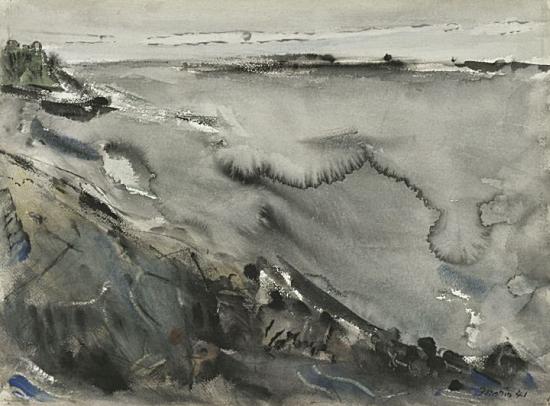
Movement: Sky and Grey Sea
1941
John Marin
d. October 2, 1953
_______________________
IV
Beauty is momentary in the mind --
The fitful tracing of a portal;
But in the flesh it is immortal.
The body dies; the body's beauty lives.
So evenings die, in their green going,
A wave, interminably flowing.
So gardens die, their meek breath scenting
The cowl of winter, done repenting.
So maidens die, to the auroral
Celebration of a maiden's choral.
Susanna's music touched the bawdy strings
Of those white elders; but, escaping,
Left only Death's ironic scraping.
Now, in its immortality, it plays
On the clear viol of her memory,
And makes a constant sacrament of praise.
Peter Quince at the Clavier
Wallace Stevens
b. October 2, 1879
1 2 3
_______________________
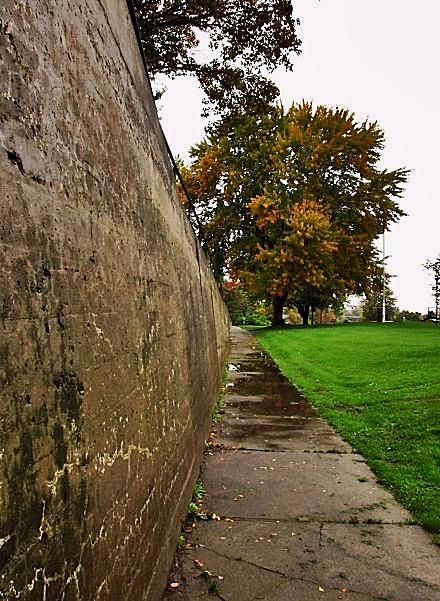
photo - mw
_______________________
Eric Hobsbawm
1917 — 2012
Interview
New Left Review 61, January-February 2010
(....)
Can there be new agencies? It can no longer be in terms of a single class, but then in my view it never could be. There is a progressive politics of coalitions, even such relatively permanent coalitions as that between, say, the educated, Guardian-reading middle class and the intellectuals—the highly educated, who on the whole tend to be more on the left than the others—and the mass of the poor and the ignorant. Both groups are essential to such a movement, but they are perhaps harder to unify than before. In a sense, it is possible for the poor to identify with multi-millionaires, as in the United States, saying, ‘If only I was lucky, I could become a pop star’. But you can’t say, ‘If only I was lucky, I’d become a Nobel Prize winner’. This is a real problem in coordinating the politics of people who objectively might be on the same side.
(....)
If you were to pick still unexplored topics or fields presenting major challenges for future historians, what would they be?
The big problem is a very general one. By palaeontological standards the human species has transformed its existence at astonishing speed, but the rate of change has varied enormously. Sometimes it has moved very slowly, sometimes very fast, sometimes controlled, sometimes not. Clearly this implies a growing control over nature, but we should not claim to know whither this is leading us. Marxists have rightly focused on changes in the mode of production and their social relations as the generators of historical change. However, if we think in terms of how ‘men make their own history’, the great question is this: historically, communities and social systems have aimed at stabilization and reproduction, creating mechanisms to keep at bay disturbing leaps into the unknown. Resistance to the imposition of change from outside is still a major factor in world politics today. How is it, then, that humans and societies structured to resist dynamic development come to terms with a mode of production whose essence is endless and unpredictable dynamic development? Marxist historians might profitably investigate the operations of this basic contradiction between the mechanisms bringing about change and those geared to resist it....(more)
_______________________
The Limits of Communication
Jodi Dean
guernica
Networked information technologies have been the means through which people have been subjected to the competitive intensity of neoliberal capitalism.
(....)
Widely celebrated for making work fun, inspiring creativity, and opening up entrepreneurial opportunities, networked information and communication technology contributed to the production of new knowledge-based enterprises. Its more pronounced legacy, however, has been widespread de-skilling, surveillance, and the acceleration and intensification of work and culture: the freedom of “telecommuting” quickly morphed into the tether of 24/7 availability, permanent work. Describing a key contradiction of communicative capitalism, Franco Berardi writes, “If you want to survive you have to be competitive and if you want to be competitive you must be connected, receive and process continuously an immense and growing mass of data,” and hence under constant soul-destroying pressure to keep up, stay alert, and remain motivated. Communication technologies made capitalism acceptable, exciting, and cool, immunizing it from critique by rendering critics into outmoded technophobes. At the same time, these technologies provided the basic components necessary for neoliberalism’s acceleration of capitalism, not to mention a bunch of super-fun diversions enabling people to feel radical and connected while playing on their laptops....(more)
_______________________

Seascape Fantasy, Maine
John Marin
circa 1944
_______________________
Writing Myself Into Existence:
A Writer's Odyssey in the Form of an Abecedarian of Sorts
Arthur Asa Berger
Illustrated with Drawings and Photographs by the Author
Enculturation 13: Open Issue
_______________________
The mere fact that Mitt Romney is even within striking distance of winning this election is an incredible testament to two things: a) the rank incompetence of the Democratic Party, which would have this and every other election for the next half century sewn up if they were a little less money-hungry and tried just a little harder to represent their ostensible constituents, and b) the power of our propaganda machine, which has conditioned all of us to accept the idea that the American population, ideologically speaking, is naturally split down the middle, whereas the real fault lines are a lot closer to the 99-1 ratio the Occupy movement has been talking about since last year.
- Matt Taibbi
_______________________
The New Price of American Politics
James Bennet
Not since the Gilded Age has our politics been opened so wide to corporate contributions and donations from secret sources. And the new era of big money has just begun. Jim Bopp, its intellectual architect, believes this is a good thing—the more money, the better, he says. Reformers (and most voters) disagree. Their battle is over the most-basic ideas of our democracy; at stake—according to both sides—is either the revitalization of politics, or its final capture by the powerful.
_______________________
The Ice Melts Into Water
Arctic Ice Melt, Psychopathic Capitalism And The Corporate Media
David Cromwell and David Edwards
media lens
_______________________

photo - mw
_______________________
The Man On The Dump
Wallace Stevens
Day creeps down. The moon is creeping up.
The sun is a corbeil of flowers the moon Blanche
Places there, a bouquet. Ho-ho…The dump is full
Of images. Days pass like papers from a press.
The bouquets come here in the papers. So the sun,
And so the moon, both come, and the janitor's poems
Of every day, the wrapper on the can of pears,
The cat in the paper-bag, the corset, the box
From Esthonia: the tiger chest, for tea.
(....)
That's the moment when the moon creeps up
To the bubbling of bassoons. That's the time
One looks at the elephant-colorings of tires.
Everything is shed; and the moon comes up as the moon
(All its images are in the dump) and you see
As a man (not like an image of a man) ,
You see the moon rise in the empty sky.
One sits and beats an old tin can, lard pail.
One beats and beats for that which one believes.
That's what one wants to get near. Could it after all
Be merely oneself, as superior as the ear
To a crow's voice? Did the nightingale torture the ear,
Pack the heart and scratch the mind? And does the ear
Solace itself in peevish birds? Is it peace,
Is it a philosopher's honeymoon, one finds
On the dump? Is it to sit among mattresses of the dead,
Bottles, pots, shoes, and grass and murmur aptest eve:
Is it to hear the blatter of grackles and say
Invisible priest; is it to eject, to pull
The day to pieces and cry stanza my stone?
Where was it one first heard of the truth? The the.
...(more)

photo - mw
_______________________
Three Poems
Oliver de la Paz
Memorious 18
Dear Empire,
Oliver de la Paz
These are your scribes. The sound of your voice from the reel-to-reel tape travels in spirals, translucent. The synchronic hiss of the acetate is like the clapper of a temple bell—sound of the hard ridges of a dragonfly wing as it slaps against glass.
A scribe’s job of translating internal phenomena into decree is akin to your dancer spilling her form as the music stops. As her feet trace the edge of the floor in silence. During winter, the tables are cold and the cyan of the ink turns a dark and viscous black. The writing feathers out, as the skill of the writers fails. There are waves in their handwriting because of weather. Because of fatigue.
You are dictating in a far off place. Your mouth is adjacent to the microphone. The texture of your voice, as painful as particulates in the air.
_______________________
Austerity, Adjustment, and Social Genocide: Political Language and the European Debt Crisis
Andrew Gavin Marshall
Political language… is designed to make lies sound truthful and murder respectable, and to give an appearance of solidity to pure wind.
- George Orwell, “Politics and the English Language,” 1946
Political language functions through euphemism, by employing soft-sounding or simply meaningless words to describe otherwise monstrous and vicious policies and objectives. In the European debt crisis, political language employed by politicians, economists, technocrats and bankers is designed to make policies which create poverty and exploitation appear to be logical and reasonable. The language employed includes the words and phrases: fiscal austerity/consolidation, structural adjustment/reform, labour flexibility, competitiveness, and growth. To understand political language, one must translate it. This requires four steps: first, you look at the rhetoric itself as inherently meaningless; second, you examine the policies that are taken; third, you look at the effects of the policies. Finally, if the effects do not match the rhetoric, yet the same policies are pursued time and time again, one must translate the effects as the true meaning of the rhetoric. Thus, the rhetoric has meaning, but not at face value.
(....)
Ultimately, one can get away with saying, “we need a comprehensive austerity package augmented by structural reforms, such as labour flexibility, designed to increase competitiveness and facilitate growth,” as opposed to: “We need to rapidly impoverish our populations, whom we will then exploit to the fullest, such as by creating a cheap labour force, which would increase elite control and generate private profits.” Such honesty and bluntness would lead to revolt, so, political language is used instead. In Europe, political language is part of a ‘power dialectic’ which supports policies and agendas that aim to take more for those who already have the most, and to take from all the rest; to impoverish, exploit and oppress; to plunder, profit and punish....(more)
_______________________

photo - mw
_______________________
State of Hypnosis
Marķa Sonia Cristoff
Translated from Spanish by Sarah Ann Wells
You wind up a loner, that’s the problem with this job. A hermit even, in comparison to what he used to be. And to think he comes from a huge family, with seven siblings, plus cousins, plus friends. Growing up there was always noise, people talking, music. His father loved music, especially classical: Schubert, Wagner, he can’t remember the other names. He was never really interested in all that. He and his brothers loved to have people around, and sometimes his father would get fed up and just sit and listen with his headphones on. Sprawled out on the sofa while everyone went over, around him. And his father with that serene smile, immune, protected by the headphones that look like those earmuffs that American skiers wear, with their flashy colors and sleek outfits. He never understood how the simple act of listening to music could transform someone in that way. But there are so many things that you don’t understand about other people, especially your parents. And he’s thought about this—about his father, he means—walking around out there, through the countryside, on so many nights. About everything he didn’t understand and, at the same time, never thought to ask....(more)
Words without Borders October 2012: Oil
_______________________

photo - mw
_______________________
I is a foreigner
Erķn Moure
jacket2
Eu son unha forasteira, sempre unha forasteira. I am a foreigner, always foreign. Loito nunha escuridade funxķbel con toda outra escuridade. I struggle in a fungible and obscure darkness alongside every other kind of obscurity. Son unha forasteira con historia, con historias multiples, historias que nunca vivķn. I am a foreigner with a history, with multiple histories, histories I never lived. Historias xenéticas, de xenética. Genetic histories, of genetics. Sempre sei que idioma uso. I always know what language I speak in. Imaxino sen imaxes, senón con temperaturas e luz e vagaridades que me pican no pel. I imagine without images, but with temperatures and light and wanderings that prickle and disturb my skin. Indescriptķbeis. Indescriptible. Postures with furniture. And I age, I am aging. Limits of the body and mind.
And the text. It is here before me, in front of me, the text. É e estį. It is in itself, and it is sited in time/space. And me, awake. With coffee. Without glasses. Light. The form of the letters in front of me.
...(more)
|

